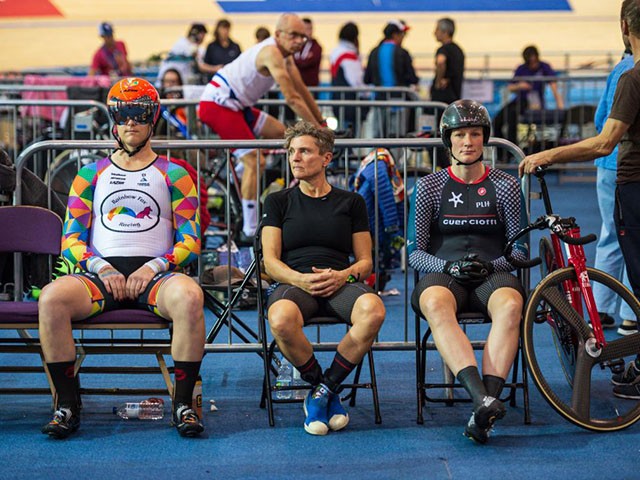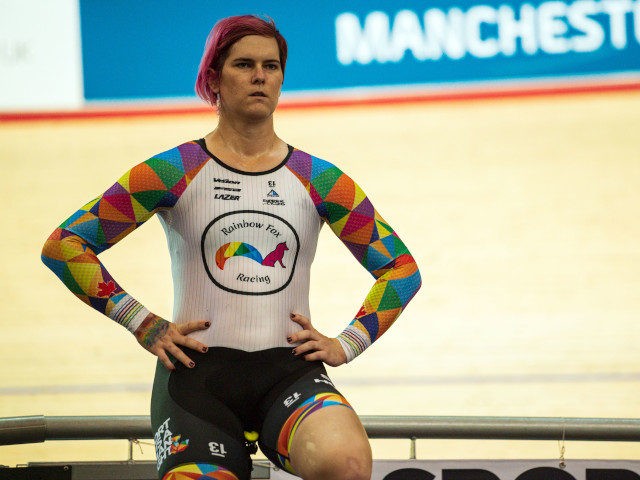Trans women are “real” women and should be competing against other women, according to transgender track cycling world champion Veronica Ivy, who called for the end of “policing who counts as a real woman.” Ivy, formerly known as Rachel McKinnon, accused “white women’s conceptions of femininity” of singling out intersex “women of color” and warned that transgender people are coming to push their agenda on every aspect of society.
Appearing on Comedy Central’s The Daily Show on Thursday, Veronica Ivy, a trans rights activist, athlete, and self-proclaimed “biological female” despite being born a male, weighed in on the debate over the inclusion of trans women in women’s sports with host Trevor Noah.
Noah began by claiming that in today’s world, “there are people who are so transphobic that it makes it almost impossible for people who aren’t to ask any questions, to have any conversations, to have any discourse, that doesn’t lump them in with transphobia.”
“It feels like one of the biggest issues in America, and, yet, no one can seem to talk about it,” he said.
Ivy won the 2018 UCI Masters Track Cycling World Championships in Los Angeles by edging out natural-born female contestants Carolien Van Herrikhuyzen of the Netherlands and American Jennifer Wagner.
Defending the right of transgender athletes to compete in the categories of their choice in sport, Ivy called sports a “human right” and a “fundamental tenet” of the Olympic movement.
“People like to say that it’s a complicated issue, and I don’t actually think it is. I think it’s very simple,” Ivy said. “It all boils down to do you actually think that trans women and intersex women are real women and are really female or not.”
“And if you do, it’s very simple. Just stop policing who counts as a real woman because this has had [a] history of racism built into it over the years,” Ivy added.
Ivy, who was sporting a hoodie reading, “sport is a human right,” blamed racism for the alleged singling out of intersex participants in sports.
“It’s not an accident that the intersex athletes who get singled out are women of color from the global south,” Ivy said. “Because who gets singled out for scrutiny is based on white women’s conceptions of femininity.”
“And that’s being weaponized against trans people, too,” Ivy added. “So it’s a fear of protecting the fragile, weak, cis white woman from the rest of us.”
Asked about the charge that trans athletes have an “unnatural advantage” over others, Ivy claimed to be a full female.
“I am a woman, that’s a fact — I am female,” Ivy said. “So all my identity records, my racing license, my medical records all say ‘female,’ and I’m pretty sure I’m made of biological stuff.”
“So I’m a biological female as well,” Ivy added.
Regarding the question of whether trans women “have an advantage over cis women,” Ivy admitted, “We don’t know.”

Canadian cyclist Rachel McKinnon (L) prepares to race against Australian Amber Walsh (2nd R) in their F35-39 sprint semi-final during the 2019 UCI Track Cycling World Masters Championship, in Manchester on October 19, 2019. – Transgender cyclist Rachel McKinnon has defended her right to compete in women’s sport despite accepting trans athletes may retain a physical advantage over their rivals. (Photo by OLI SCARFF/AFP via Getty Images)
Despite there being “basically no published research on this question,” Ivy insisted, “there’s good reason” to believe there is no such advantage, though arguing the whole question is of no relevance.
“I think it’s irrelevant because we allow all kinds of competitive advantages within women’s sport,” Ivy said, noting the differences in height between the first place winner and the one who came in tenth place during the 2016 Rio Summer Olympics women’s high jump final.
“So a 10.5-inch height difference between first and tenth at the Olympics in high jump, and we call that fair,” Ivy said, noting, “the range of body types within the female category is way, way bigger than anything that could be attributed to trans women.”
“So if there’s an advantage — and I’m not saying that there is — for trans women in women’s sport, it’s not an unfair advantage,” Ivy added.
Ivy also claimed that despite trans athletes competing “at the highest level for decades,” none have won an elite world championship or Olympic gold medal.
“This Tokyo Olympics was the first time a trans woman even qualified for the Olympics,” Ivy said. “So this idea that trans women are suddenly going to take over women’s sport is an irrational fear of trans women, which is the dictionary definition of transphobia.”
After Noah posed the argument that trans women could and should be able to compete in men’s races, Ivy appeared offended.
“But they’re women and they’re female,” Ivy said. “So, like I said, this boils down to are trans women really women? Are they really female? Because if you think yes, we belong competing with other women.”
“It’s an extreme indignity to say, ‘I think you’re a woman except for sport,’” Ivy added, noting the significance of sports in society.
After Noah asked if “we’re limiting ourselves by saying ‘men’s’ sports, ‘women’s’ sports, when we now know there are so many more genders,” Ivy called the question important and difficult but ultimately a separate one.
“The question we’re talking about is given how sport is currently structured, should we include trans women and intersex women in women’s sport? And my answer to that is a clear yes,” Ivy said.
“If you want to say should we revisit how we structure all of sport, I would say, yeah, we should do that,” Ivy added. “But if your only reason for doing that is because you just can’t accept trans women are women, that’s a problem I’ve got with you — not with you personally.”
Asked about a biological woman from birth who was raised a woman and experienced life as one, telling a trans woman that she feels more time is needed to determine any advantages trans athletes may have before allowing them to compete with other women, Ivy argued, “that’s not how human rights work.”
“The way human rights work in the default is inclusion, and the burden of proof is on the people seeking to exclude, not the people seeking to include,” Ivy said.
Later, Noah asked Ivy to explain if “natural” hormone levels can be advantageous, disadvantageous, or neither.
“I’m a little confused — and forgive me if I’m slow to understand this — [but] you just said the natural level doesn’t give you an advantage or disadvantage. But you said if people do have an addition or subtraction of it, it does give you an advantage or disadvantage?” the host asked.
In response, Ivy admitted, “it affects things.”
“For example, my body doesn’t produce testosterone and it hasn’t for a decade, but I switched sports from a road cycling event to a track power event and I switched training and I put on 25 pounds of muscle, and I went from being able to squat 170 to 375,” Ivy said. “So I don’t produce any testosterone, and I squat a lot. And that’s just because I changed training.”
“So it’s not so simple as, okay, if you drop your testosterone, you will get weaker,” Ivy added. “Because if you change your training, your diet, your rest and recovery, your sport — your performance can change.”
In a rather bizarre moment of the interview, Noah failed in an attempt to quell any fears that transgender people would seek to push their agenda on more and more parts of society.
“It seems like we’re always going to end up in a cul-de-sac because many people use it as a cudgel, I’ve realized, to scare people [into thinking]: ‘The transgenders are coming for you — your bathrooms, your sports, your everything…’”
“Oh, we are,” Ivy interrupted, eliciting applause from the audience and to which a seemingly unprepared Noah awkwardly replied, “Be careful what you say.”
Noah concluded by agreeing with his guest that “the research, the science, everything hasn’t caught up.”
The interview comes as pro-LGBTQ sentiment and transgender propaganda continue to be featured in the media.
Last week, President Joe Biden’s Assistant Secretary of Health Rachel Levine, who is transgender, called “gender-affirming care” for youth, a far-left euphemism for child mutilation, a “lifesaving” and a medical necessity.
“Gender affirming care is lifesaving, medically necessary, age-appropriate, and a critical tool for health care providers,” Levine said.
Biden official Rachel Levine: Sex reassignment surgery and puberty blockers for KIDS is “lifesaving, medically necessary, age appropriate, and a critical tool” pic.twitter.com/OwSOA3cjj8
— RNC Research (@RNCResearch) June 27, 2022
Last month, Fina, the group that governs swimming competitions worldwide, minted new rules that exclude males who have experienced puberty from women’s competitions.
Follow Joshua Klein on Twitter @JoshuaKlein.

COMMENTS
Please let us know if you're having issues with commenting.